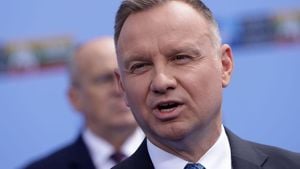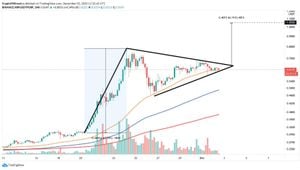The 2025 Bundestag election results indicate a significant shift in the political dynamics within Thuringia, as the Alternative für Deutschland (AfD) party took the lead with unprecedented support. According to early results, the AfD garnered approximately 39.6% of the votes, affirming its position as the dominant political force in the region. This marks a considerable uptick from past election performances and showcases the party's increasing traction among voters.
Following the counting of votes from more than 95% of polling stations, the next closest contender was the Christian Democratic Union (CDU), which secured around 18.6%. Meanwhile, Die Linke (the Left party) managed to attain 15.2% of the votes. Other parties such as the Bündnis Sahra Wagenknecht (BSW) and the Social Democratic Party (SPD) faced disappointing outcomes, with BSW receiving 9.4% and SPD falling to just 8.7%, their lowest results historically. The Free Democratic Party (FDP) and the Greens were largely absent from the electoral map, earning only 2.8% and 4.2%, respectively.
At the heart of the AfD's success is party figure Björn Höcke, whose leadership has galvanized members and followers alike. Höcke celebrated the results during the party gathering, stating, "We have doubled our results. Our hand is extended to forge the political future of Thuringia." This sentiment of readiness to engage with broader coalition opportunities suggests the possibility of significant political shifts.
The backdrop against which these elections occurred included the controversial governance of the federal government, which was perceived negatively by voters, particularly concerning issues like immigration and economic policy. The fervent support for the AfD has been viewed not just as electoral success but as popular discontent aimed at the current coalition government's handling of such pivotal issues.
Friedrich Merz, the CDU’s lead candidate, acknowledged the results with caution. He stated, "We have achieved what we aimed for, being the second strongest force, yet the public outlook and issues must be our focus moving forward." His remarks reflect the CDU's need to recalibrate its strategies amid changing voter sentiment.
The election also bore witness to record voter turnout, reaching about 80.6%, which surpasses previous electoral statistics. This active participation reflects heightened voter engagement, particularly among those disillusioned with mainstream parties.
Bodo Ramelow, the exemplary candidate for the Left party, captured his constituency but acknowledged the party’s declining overall influence. He remarked, "From being declared politically dead, we’ve showcased our resilience. Many younger supporters rallied us back to the narrative." His comments highlight both the personal stakes and the broader ideological battles being waged within Thuringia’s political arena.
The anticipated shifts extend beyond immediate electoral gains, with many political analysts pondering future coalition formations. Stefan Möller of the AfD hinted at potential personnel changes within the party's leadership, stating, "We need to continue transforming to stay resilient and relevant. Internal structures must be dynamic. We won’t become stagnant." This internal focus points to the AfD's intent to adapt strategically to maintain its momentum.
Germany's newly implemented electoral law reform complicates the results as not all candidates who win their constituencies will automatically gain seats in the Bundestag, marking this election distinctively within the historical fabric of German elections. The focus is now on how well the parties will perform nationwide as well as regionally post the revolutionary changes.
For the BSW, the election results left them teetering on the edge of organizational uncertainty. Party co-leader Katja Wolf expressed, "There’s both hope and hesitation. This election will define the path for our party’s viability within the Bundestag." This captures the essence of how minor parties perceive their roles following results where major shifts overshadow their presence.
Discontent brewed within the SPD ranks, with the party’s leadership acknowledging the gravity of their situation. SPD’s Georg Maier described the results as “bitterly disappointing,” pointing toward party accountability and reinforcing the notion of a disconnection between the party's messaging and voter sentiment. Maier's words capture the desperation felt during this election's aftermath, highlighting the urgent need for introspection and revitalization within the party.
Meanwhile, CDU's Christian Hirte asserted, “A new mandate for immediate governmental engagement emerges,” showcasing the CDU’s strategy of positioning itself as the necessary antidote for current political challenges.
The election results herald not just changes on the party level but advocate for new dialogues among already established political entities. With nearly 1.7 million residents engaged, the outcome begs the question of what direction Thuringian politics will take next as stakeholders reevaluate their roles amid surging AfD morale.
With these results, observers remain curious about Thuringia's voting behavior and how it will shape or disrupt the broader German political narrative as coalitions are deliberated, policies assessed, and the next electoral season approached. The 2025 Bundestag elections could become emblematic of larger trends within both regional and national frameworks.



